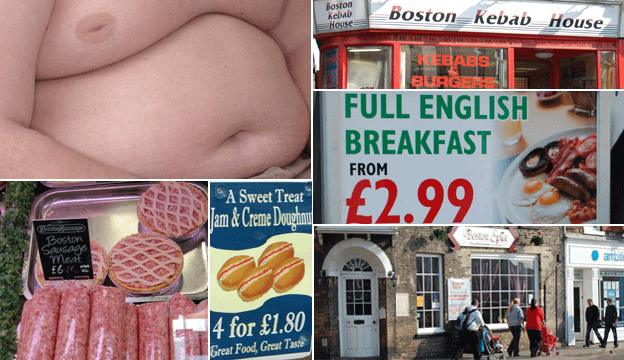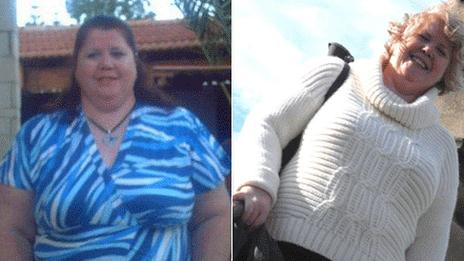How Boston is battling to shed its 'fattest town' image
- Published

Once dubbed Britain's fattest town, people living in Boston, Lincolnshire have been working hard to shed that image.
Slamming the door of the kebab shop shut, two teenagers stuff a handful of chips into their mouths and walk down West Street.
It is a scene that is repeated up and down high streets in England.
But the title of fattest town fell to Boston in 2007 after a series of NHS community health profiles, external showed 31% of adults in Boston - a mid-sized market town famed for its sausages - were obese.
However, local health workers in the town say the tide has turned.
Health trainer Siobhan Bernadin, 52, who weighed as much as 23 stone (146kg), struggled with obesity for years.
Her weight problems peaked after she broke her spine in a horse-riding accident and lost her husband to kidney disease.
"It was especially hard when I was immobilised and in a wheelchair - the weight just piled on. My husband died and I started comfort eating."
She said her GP "sort of gave up on me" and suggested a gastric band, but she changed her mind after seeing some leaflets about health trainers in Boston.
Mrs Bernadin, who now works part-time for Lincolnshire Community and Voluntary Services, lost nearly seven stone (38kg) over five years.
"It was the small and realistic changes to my lifestyle that made the difference," she said, such as keeping a food diary, adding a piece of fruit to every meal and sticking to a strict exercise regime.
Health experts say they do not have adult obesity figures, external more recent than 2006 because the cost of collecting them has become too expensive.
But annual child obesity statistics are available - and they show an encouraging trend.
Public Health England has found the proportion of obese children in Year 6 (12-year-olds) in Boston has fallen over the past year from 22% to 17.5%, something that is not reflected nationally.
Although the figures for that age group tend to fluctuate, they indicate an overall decline in child obesity in the town and surrounding area over the past six years.

Siobhan Bernadin (2008 on left and 2012 on right) almost had gastric band surgery before getting help from a health trainer
East Midlands GP Ian Campbell, who specialises in obesity, said he was pleasantly surprised but also convinced the battle is not yet won, external.
"We are slowly tackling the rate of increase in obesity but the total numbers are still going up - 25% of adults remain obese nationally.
"We all sit on our backsides and watch telly and play on Xboxes and we drink far too much alcohol, and snack on sweet foods whenever we want when once they were rare treats.
"Town planners need to make sure the streets are lit - so children can run and walk safely - and reduce the speed limit for the same reason.
"We need to make it attractive to go to the gym and to the swimming pool - all this needs to be made affordable."
Steps have been taken to tackle the town's problem.
Giant climbing frames for adults in town parks, guided walks over the fens and cooking classes where low-income families can learn to prepare home-grown vegetables are all now available.
Confidence issues
Mrs Bernadin said those who struggle with weight problems, as she did, "need a lot of hand holding until they feel comfortable about themselves".
"It is a big confidence issue and often involves mental health and alcohol problems - they are all interconnected."
She said some people, for instance, will not go to aqua aerobics because they are afraid of what they will look like in a swimming costume.
"They have to set their own goals - we simply help them to achieve them. It is ultimately your lifestyle that makes the difference."
Although Lincolnshire still has a slightly higher rate of obesity than the rest of the country, local authorities like Boston Borough Council say they have pushed hard to change attitudes.
Ideas like the introduction of child-sized plates at schools have made a dent, health consultant Chris Weston said.
"Children don't need a huge scoop of chips - and the plates drive the point home," Mr Weston said.
"The whole of the east coast in Lincolnshire including Boston is one the most deprived areas of the country - incomes and aspirations are low.
"As sure as eggs are eggs - there is a strong link between deprivation and health."
Boston butcher Scott Palmer is convinced more fresh meat and vegetables would help make a difference.
"The people in Boston people who are overweight ... that is probably the result of a poor diet. Often their diet is full of ready meals which are full of fat.
"Lincolnshire is renowned for its cauliflower and broccoli but still has a problem with overweight people - that's quite ironic."
- Published22 April 2013
- Published23 February 2013
- Published17 February 2013
- Published5 January 2013
- Published16 August 2012
- Published16 April 2012